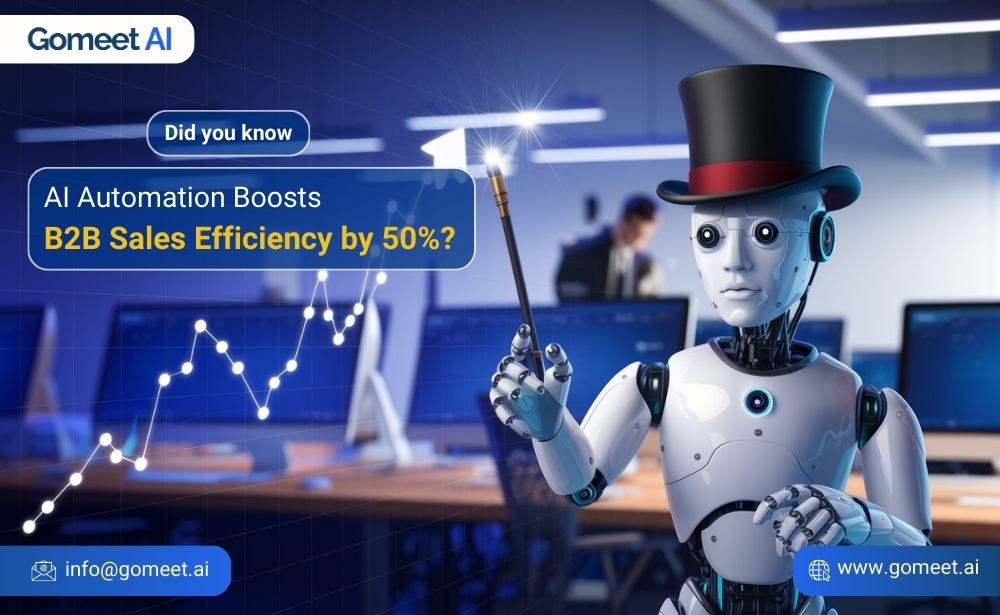Why B2B Sales Need Automation Now More Than Ever
B2B sales teams are facing increasing pressure to streamline operations, engage prospects faster, and close deals more efficiently. Here, AI scheduling software, sales lead automation, and AI-driven B2B sales tools are making all the difference.
Automation in B2B sales isn’t just a trend; it’s a transformative force. According to McKinsey, companies using AI-driven sales automation report 20% shorter sales cycles and a 50% improvement in lead-to-deal conversion rates. Traditional sales approaches often involve time-consuming tasks like lead qualification, scheduling, and follow-up communication. These manual processes are not only labor-intensive but also prone to delays and errors, impacting productivity and lead quality. Sales lead automation changes the game by optimizing time management and lead handling, while AI-powered tools enable more precise targeting and personalized interactions.
In this blog, we’ll explore how automating B2B lead software through AI-driven solutions can significantly enhance sales efficiency, reduce operational costs, and drive growth.
1. The Future of Sales: How AI Scheduling Software Enhances Sales Productivity
Leveraging AI Scheduling for Time Management in B2B Sales
In the B2B space, time is critical. Sales teams frequently juggle meetings, follow-ups, and client interactions, often struggling to optimize their schedules. AI meeting schedulers are revolutionizing this process. With AI scheduling software, sales teams can automatically book meetings, assign time slots, and send reminders—minimizing manual work and allowing reps to focus on high-value tasks.
Benefits of AI Scheduling in B2B Sales:
- Reduces idle time by automatically filling gaps in the schedule.
- Avoids scheduling conflicts by syncing with calendars in real time.
- Boosts response time as clients can book directly, improving engagement and reducing delays.
According to Accenture, companies using AI-driven scheduling tools see a 25% increase in productivity and 30% faster response times to client requests. This level of efficiency is invaluable, particularly in high-stakes B2B sales where every minute counts.
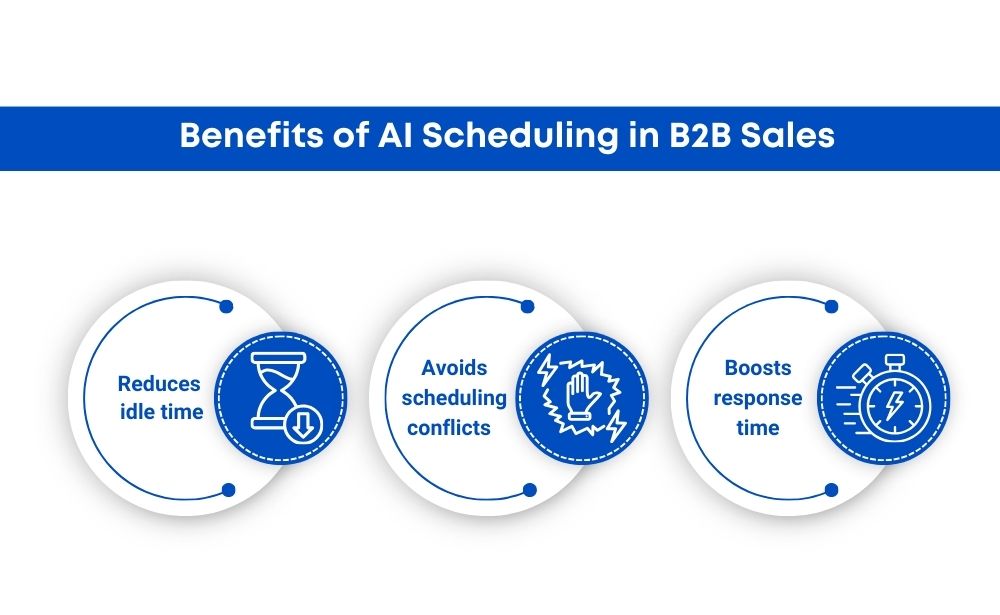

2. Sales Lead Automation: From Lead Capture to Nurturing with Minimal Effort
Understanding the Power of Sales Lead Automation for B2B Success
Effective lead management is the backbone of successful B2B sales. With sales lead automation, teams can handle lead capture, qualification, and nurturing seamlessly. This automated process not only accelerates lead handling but also improves lead quality by filtering out unqualified prospects early.
How sales lead automation works:
- Lead Capture: AI captures leads from multiple channels—websites, emails, and social media.
- Lead Qualification: Through automated lead filtering, AI systems assess lead relevance based on predefined criteria.
- Lead Nurturing: Using AI lead nurturing software, sales teams keep prospects engaged through personalized emails and targeted content.
Statistics from HubSpot show that companies using automated lead filtering experience a 20% higher lead-to-customer conversion rate and 30% reduction in sales cycle length. By automating lead handling, sales reps can prioritize quality leads and spend more time on conversions rather than qualification.
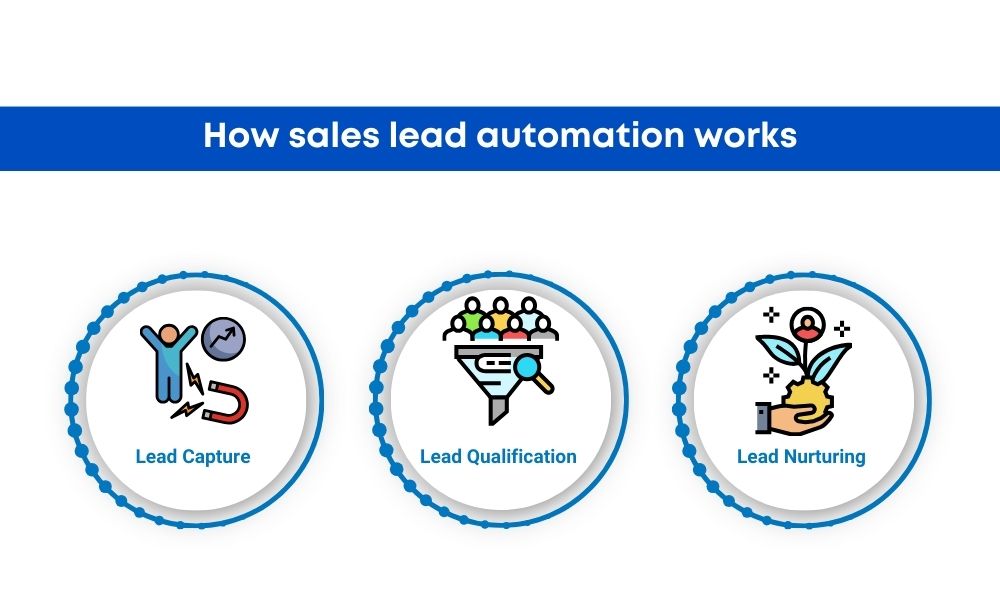
3. AI in B2B Sales: Building Relationships with Data-Driven Personalization
Using AI for Hyper-Personalized Lead Engagement in B2B
In B2B sales, personalization goes far beyond a basic email template. With AI for B2B personalization, sales teams can deliver targeted messages based on each prospect’s unique needs and behavior. AI’s predictive sales analytics capabilities analyze customer data, enabling teams to send the right message at the right time.
How AI Enables Hyper-Personalization:
- Analyzes past interactions to determine optimal engagement strategies.
- Segments leads by behavior, industry, and buying journey.
- Customizes outreach to address specific client pain points, boosting engagement.
Studies reveal that AI-based personalization can increase engagement by 40% and boost conversion rates by 35%. By utilizing predictive sales analytics, sales teams can turn data insights into meaningful interactions, fostering stronger client relationships and improving the likelihood of closing deals.
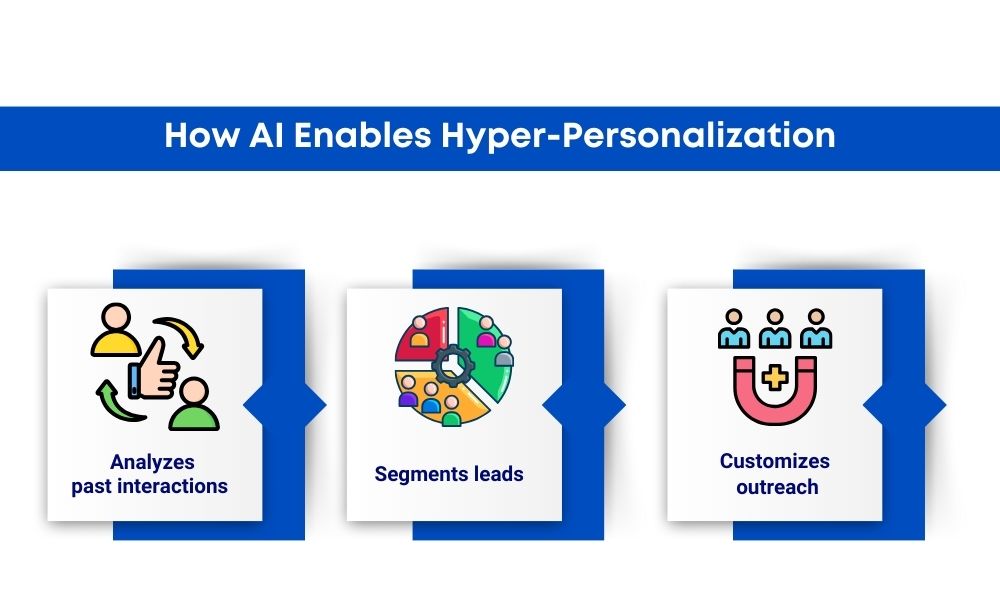
4. Implementing AI B2B Sales Tools to Streamline Your Sales Funnel
Simplify the Sales Funnel with AI-Driven Lead Management
The sales funnel is a critical component of B2B sales, encompassing stages from initial contact to conversion. Sales funnel AI automation optimizes each step, from lead generation to deal closure, by ensuring that leads move smoothly through the funnel without manual intervention.
Key Stages of an AI-Driven Sales Funnel:
- Prospecting: AI tools identify potential leads based on specified criteria, saving reps time.
- Engagement: Automated follow-ups keep leads moving along, reducing dropout rates.
- Closing: AI insights help reps choose the right communication at the right time, enhancing close rates.
A recent case study by Gartner found that AI-optimized sales funnels reduce time-to-close by 25% and improve conversion rates by 35%. Streamlining the funnel through automation enables sales teams to focus on more strategic, high-value tasks while AI handles the repetitive processes.
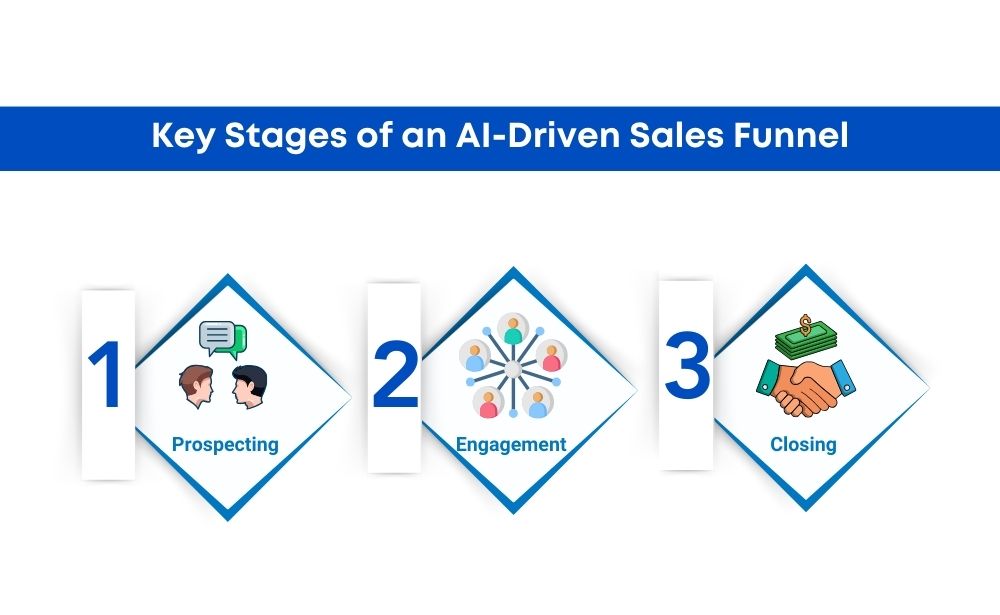
5. Key Benefits of Using AI B2B Sales Automation for Revenue Growth
Quantifying the ROI of AI Automation in B2B Sales
When it comes to B2B sales, the ROI of automation is clear. From improved AI-driven lead conversion rates to faster response times, AI B2B sales automation significantly boosts revenue and efficiency.
Core Benefits of AI in B2B Sales Automation:
- Higher Lead Conversion: AI-enhanced targeting leads to 40% higher conversion rates.
- Operational Efficiency: Sales reps spend 30% less time on non-sales activities, focusing more on deal closure.
- Enhanced ROI: AI-powered tools help businesses achieve 20% higher returns on marketing investments.
Deloitte reports that 60% of B2B companies implementing AI automation experience positive ROI within the first year. As AI tools become more accessible, businesses can quickly enhance revenue, optimize resources, and prepare for future market demands.
Conclusion
The adoption of AI scheduling software, sales lead automation, and AI-driven B2B sales tools is redefining the landscape of B2B sales. In an industry where time, personalization, and responsiveness are paramount, these tools empower teams to operate with unprecedented efficiency.
By implementing AI-powered sales automation, companies can reduce time spent on routine tasks, optimize lead management, and elevate client engagement. Now is the time for B2B businesses to embrace automation, not only to stay competitive but to lead in an era defined by digital transformation.
If you’re ready to transform your B2B sales strategy, consider exploring AI-based tools designed specifically for sales automation. The benefits are clear—enhanced productivity, increased lead conversion, and higher ROI. Begin your journey towards an automated, future-ready sales process today.

